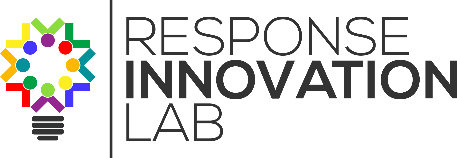Our strategic partnership with Response Innovation Lab
Our new partnership with RIL will focus on equitable providing access to connectivity to vulnerable populations in emergency contexts.


Together with Response Innovation Lab (RIL), we are announcing a strategic partnership to scale further and support innovations around access to connectivity in humanitarian and emergency contexts. As technology enables responders and humanitarian aid organizations to help those affected by disaster, conflict, war, and climate change, the partnership between RIL and 48percent.org aims to integrate technologies that better enable vulnerable populations and humanitarian actors with the resources and tools they desire and need by:
- The sharing and exchange of technical inputs on projects, opportunities, and innovations
- Supporting innovators through the utilization of the RIL’s tools and services
- Collaborating around advocacy that supports innovation in the thematic area of connectivity
- Furthering partnerships that support the integration of innovations to humanitarian contexts
The alignment of the two initiatives combines 48percent.org’s focus on equitable access to connectivity with RIL’s aim to better support vulnerable populations in emergency contexts. Together, we can work towards connecting the demand for solutions with the supply of field-tested innovations. For news on the results of this partnership, keep an eye on our website and follow us on Twitter, LinkedIn, or Facebook.
An introduction to our new partner
The Response Innovation Lab (RIL) was founded by humanitarian professionals from some of the world’s leading NGOs – World Vision, Save the Children, Oxfam, and Civic – who experienced first-hand how difficult it is for innovative solutions to be piloted, tested, and scaled in emergency contexts, where they are most needed. RIL’s mission is to create a circle of support that increases the impact of humanitarian responders at the level of the response and within communities, camps, households, and individuals by removing barriers to the delivery of aid. Our labs serve all organizations in a humanitarian crisis – governments, NGOs, entrepreneurs, community-based organizations, academics – that support addressing the needs of the most vulnerable people in a community through a problem and solution analysis, localized-adaptation support to sound innovation models, and investments to pilot, scale and ultimately bringing innovations to market. By doing so, RIL helps develop an effective, dynamic ecosystem that maximizes the innovation potential within each response and achieves better outcomes for crisis-affected communities.
